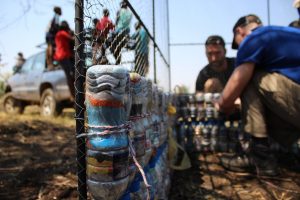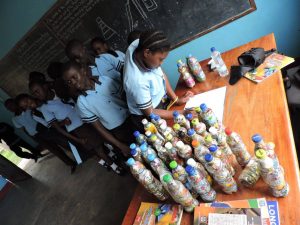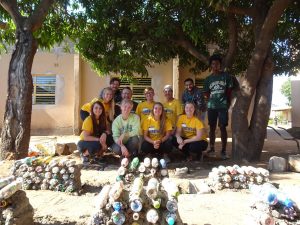News
Manchester, United Kingdom — 22-25 September 2009WYSE Archives
![]()
Spotlight on Sustainability: African Impact’s award-winning volunteer project
When African Impact set out to find solutions for the extreme poverty and inadequate infrastructure in Livingston, Zambia, they created a unique model for a simple and sustainable volunteer project. The Build-It volunteer project launched in March 2016, after 10 years of working and connecting with communities in Zambia. In less than two years, African Impact has made an enormous difference in the daily lives of residents. They’ve also been awarded for the Outstanding Volunteer Project in the 2017 Global Youth Travel Awards by WYSE Travel Confederation.
“This is the second award we have won for ‘Build-It’ this year, so it is a huge testament to the commitment and passion of our team of staff and volunteers on the ground. We are proud to be responsible leaders in the volunteer travel industry, and awards like this really do highlight what good volunteer organizations are capable of achieving,” said Andrew Procter, MD, Managing Director for African Impact.
The Build-It volunteer project stands out in its simplicity. Livingston doesn’t have any waste management system, so African Impact
decided to utilise the unrecyclable plastic lying on the ground to construct approved, structurally-sound buildings with eco-bricking. An eco-brick is a PET (polyethylene terephthalate) bottle filled with soft plastics. This includes cellophane, chip packets, sweet wrappers, plastic bags and anything else that can’t easily be recycled. Volunteers help pick up litter, collect plastic bottles and trash from local hotels, and create the eco-bricks.
“Not only does our project provide safe and affordable infrastructure for the local community using eco-bricks, it helps preserve Livingstone’s ecology, by reducing litter and waste,” Procter said.
Helping more than the environment
Aside from providing sustainable structures and community buildings for local Zambian people, the Build-It sustainable volunteer project is about education and empowerment. Volunteers work closely with two local communities – Linda Farm and the Dambwa community. Both communities desperately needed affordable, sustainable infrastructure. Build-It volunteers are not only able to create these sustainable structures for better quality of life, but these new structures are then used by the communities for financial and educational gain.
At Linda Farm, a community which empowers and rehabilitates residents with disabilities, Build-It volunteers helped build a compost bin, chicken coop and piggery. These structures help the community generate income and become self-sustainable. Eco-bricks have been used to make seating for students at the Dambwa community. Volunteers have also worked to enhance the learning environment in that community by adding classrooms and blackboards.
But, this sustainable volunteer project hasn’t stopped at infrastructure. Volunteers have also worked to educate students at five local schools about waste management, deforestation, and environmentalism. Build-It volunteers operate a ‘swap shop’ at one school. Students can exchange the bricks they’ve made from litter for prizes ranging from pencils to items of clothing. As a result, African Impact has received more than 3,000 bricks from students.
“We hope to roll this initiative out on a wider scale across Livingstone, but for the time being it is clear to see that the Build-It project is a clear representation of how working together can lead to the empowerment of a community,” said Procter. “Without giving young people a full understanding of why it’s important to care for your environment and the consequences of that, we can’t expect them to become change leaders in their community.”
Developing global citizens
African Impact said their Build-It sustainable volunteer project is unique from many other international volunteer programmes in that volunteers work alongside locals every day, from community liaisons to local tradespeople.
“The opportunity for cross-cultural exchange and learning is enormous,” explained Procter. “Both international volunteers and local people come away having learned a considerable amount about each other’s culture, and in particular, gain insight into how building structures differ between countries. We know this cultural exchange has the power to really change mindsets, perceptions and alter behaviours that can have a hugely positive effect on individuals and communities.”
The Build-It project also has another unique offering. Volunteers are often involved in the planning process of a build, as well as assisting with purchases of materials and discussions with community members. They gain skills for project management, as well as construction. Volunteers experience farming and harvesting crops when they work closely with the local community to find solutions for generating income.
And, because African Impact recruits volunteers from all around the world, Build-It volunteers get the opportunity to live and work alongside like-minded volunteers from many different backgrounds. African Impact leads extra activities to further develop volunteers’ skills and experience. They also hold presentation evenings to present and discuss relevant topics, including conservation education, the political climate in Zambia, language lessons and more.
“Because of these initiatives, I can confidently say that our volunteers leave this program as Global Citizens.”
Would you like to learn more about African Impact’s Build-It volunteer project and how your organisation can implement a simple, sustainable volunteer initiative? Andrew Procter, MD, Managing Director for African Impact, will lead a webinar exclusively for WYSE Travel Confederation members on 13 December at 10:30 CET. Register here to participate in the webinar and Q&A session.



